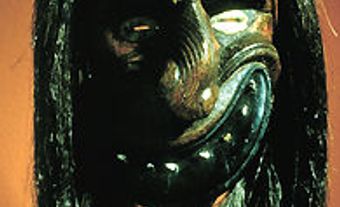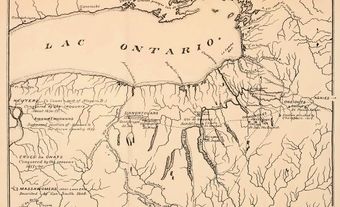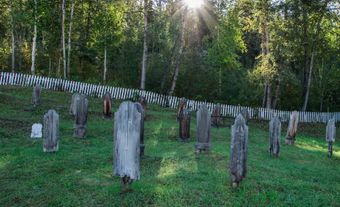Huguenots
Huguenots, a popular term used since 1560 to designate French Protestants, some of whom became involved in the Newfoundland fishery and Canadian fur trade, and in abortive colonization attempts in Canada (1541-42), Brazil (1555) and the Carolinas (1562-64). The Edict of Nantes (1598), granting limited toleration, enabled Pierre Chauvin and the Sieur de MONTS to found bases at TADOUSSAC (1600) and PORT-ROYAL (1605), and Reformed pastors to serve fishermen and sailors. Missionary work was restricted to Roman CATHOLICS, however, and after 1627 in Canada and 1659 in ACADIA neither Protestant worship nor Protestant teaching was permitted.
A trickle of Huguenots continued to find their way to Canada and Acadia as merchants, artisans, soldiers, fishermen, indentured servants and even FILLES DU ROI. They were forced to lives as "good Catholics" by attending mass and having their marriages solemnized by the church and their children baptized by the priest. Secretly many continued to hold their Reformed religious convictions and to marry into families sharing those views. In 1683 the Intendant complained to the authorities in Versailles that at least 60 "heretics" had left the colony for neighbouring English Protestant colonies. Following the revocation of the Edict of Nantes in 1685, some leading merchants were forced either to abjure Protestantism or to return to France.
In the 1740s and 1750s Protestant commercial activity at Québec and Louisbourg became significant. Both the colonial government and Catholic religious communities dealt with metropolitan French Protestant and Jewish firms. Recent research indicates the total number of Protestant immigrants during the French régime to have been at least 1450.
The British conquest brought freedom of worship and the term "French Protestant" came into use. On 10 August 1764 the Protestant religion gained official status and soon some Huguenots were appointed to important offices on the governor's executive council, the courts and bureaucracy. The plan to attract a French Protestant immigration and have francophone Anglican clergy replace the Catholic clergy met with little success. The few converts gained by the Church of England Mission to the French-speaking population of British North America and the London Missionary Society renounced their language as well as their religious affiliation. No strong French Canadian Protestant church resulted.
In 1834 the independent Lausanne Missionary Society established a centre at Grande-Ligne, Lower Canada. In 1839 the French Canadian Missionary Society was organized in Montréal, and in 1846 a Bible college was established at Pointe-aux-Trembles, and the publication Le Semeur canadien was launched in 1853. The Montréal Presbyterian College, established 1867, assured the training of French Reformed clergy after 1880. In 1875 a synod was called to organize a national Reformed church, but the scheme was abandoned in 1877 in favour of independent local congregations. Although the Grande-Ligne missions joined the BAPTISTS, many French Protestants affiliated with the PRESBYTERIANS, eventually to become francophone congregations of the UNITED CHURCH OF CANADA.

 Share on Facebook
Share on Facebook Share on X
Share on X Share by Email
Share by Email Share on Google Classroom
Share on Google Classroom


